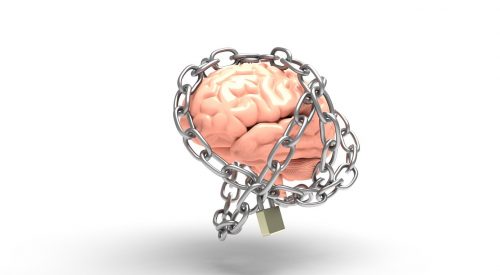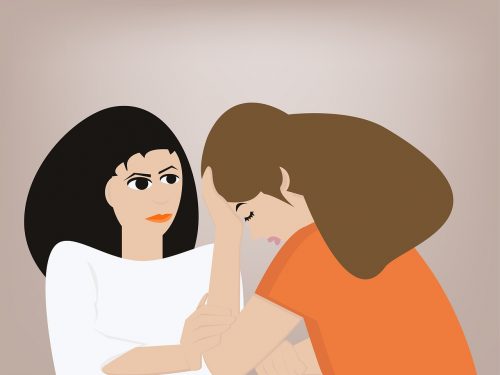
We often hear people say “I’m so depressed” or “I’m so OC,” and these may be just expressions used by them to describe their slightly changed mood anytime during the day. People think this is just a funny statement that they can joke about, but depression is a serious matter. It is not something laughable. Psychologists will agree that a mental health illness is a disruption of a person’s mood, thinking, or behavior, and this usually goes on for more than two weeks. This can occur at any time, anywhere, and in weeks, months, or even years that make it difficult for them to do regular physical activities daily. This illness exhausts them physically, mentally, and emotionally.
The first thing that you must do is to practice calmness, despite knowing that someone you love is going through a difficult time. According to Mindy Newman , MA, MTS, LMHC, “Even when our anger is not being unloaded and stays stewing inside of us, the angry thoughts are still quite destructive.”
There is one in five people who has a series of symptoms of mental illness in a day, and they are not even diagnosed. And with loving a person with mental illness, it could be very challenging, but there are a lot of mechanisms available for you to cope. (One of these mechanisms is BetterHelp. The have apps and channels that you can visit.)
Anyway, below are some misconceptions people have about a person with mental illness and how it can affect you and your partner’s relationship.

Mental Health Illness Is Not A Character Flaw
There is a misconception that mental illness is a result of bad behavior or attitude of a person, but this is not true. Mental illness can be inherited or is due to malfunctions of certain parts of the brain. As a loved one, remind your partner that it’s not their fault for having a psychological illness just as portrayed in mental health on TV. And if the person thinks this way, tell him that this is not a flaw. Make sure that you will be there to support your loved one throughout.
Effective Treatment Is Available
Even today, there is still a stigma about therapies and treatments and how they are only for ‘crazy’ people. The person with illness might have doubts seeking help and can be embarrassed to have therapies and treatments. But you can help your partner be confident enough to see a doctor and undergo treatment for his illness. Tell your loved one that this is not something to be embarrassed about and that you will be there every step of the way. There are a lot of types of therapy out there such as humor therapy, movie therapy, and many more than can help.
John Harrison, LPCC said “Relationships thrive when partners focus on growing themselves and their connection.”
They Are Committed To Difficult Treatments
Depending on what type of mental illness your loved one is suffering from, there will be treatments that may need to be long term. Medication is sometimes needed, and there can be side effects that can discourage your loved one to continue the treatment. Remind your loved one that dropping out of the treatment can only make the illness worse. Encourage your loved one to continue and share your struggles so they would know that you are also having a hard time but is not giving up.
People With Mental Health Illness Can Live Full Lives
People that undergo treatments sometimes feel like they are outsiders and cannot enjoy normalcy. But that is not true, and you have to be there and tell them that even though they have a mental illness and are undergoing treatment, they can still have fun and live life to the fullest.
These treatments are not hindrances, but rather it will help your loved one become better to enjoy and live a life full of happiness and positivity.

A Diagnosis Doesn’t Define A Person
Many individuals believe that if they have a mental illness, they cannot do the usual stuff. They may also feel like they can worsen a situation and that they are irrelevant. Remind your loved one that their illness is not who they are. They are not just somebody who is sick and is undergoing treatments. Remind them of how strong and incredible they are and how important it is that they are doing what’s best for their lives and that through all of their trials, they remain strong and become stronger. Remind them they are relevant to you and that no matter what, how you see them will never change.
People With Mental Health Illnesses Are Encouraged To Communicate
Treatments can be very overwhelming, and a person undergoing one can sometimes be overwhelmed and emotional that are so hard to handle, so the fall silent. It is hard to look at your loved one having a relapse and having doubts. The best thing to do is to tell them that you are there to listen to their doubts and frustrations, and you will support them through this process. Remind them that you all are living a beautiful life and that it’s not an option to give up.
Grace Malonai, PhD, LPCC, DCC said “Highly sensitive people are more likely to be self-reflective and think about the consequences of their actions.” As such, become more patient and understanding in dealing with them.
There will be ups and downs, and coping with a disorder can be challenging. But you need to be strong, so you can show your loved one that no matter what, you will hold their hand and fight this battle together.
